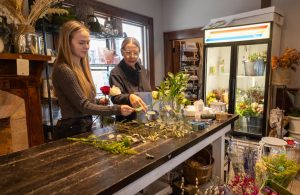New River Conservancy receives funds to fix erosion in Greenway Park
January 24, 2019
The New River Conservancy has partnered with the town of Boone and Watauga County to restore eroded river beds along Greenway Park.
NRC president George Santucci said the erosion in Greenway Park has greatly damaged the water quality of the South Fork New River.
“The mud that is coming off of the banks is probably one of the greatest water quality threats in the United States,” Santucci said. “The sedimentation seals in spaces between the rocks where a lot of animals live. If that is all filled in with mud they have no habitat.”
Santucci said erosion along the riverbank causes plants to fall into the river, which destroys habitats for terrestrial species and eliminates food sources for fish in the river.
“In the case of the county, this erosion has been at such a great rate that it could cause the actual surface of the Greenway or footpath to fall into the river,” Santucci said.
The NRC is located in West Jefferson and is dedicated to protecting and serving the New River Watershed. Boone and Watauga County have been significant partners in this area, Santucci said.
“All projects that we do require funding from multiple sources,” Santucci said. “They require some match to the grant that we submit to them. It’s best that the match is from local sources because it shows that the project is supported locally.”
The funds for the restoration project come from a government grant called the Clean Water Trust Fund said Rennie Brantz, mayor of Boone.
“We all benefit so much from the rivers,” said Lynne Mason, Boone town councilor. “It’s the town’s water supply so we have an interest in maintaining water quality.”
Brantz said the restoration project was also important because of flooding in Boone.
“The town drains into the river and its capacity isn’t big enough to deal with the flood waters that come from the town,” Brantz said. “The restoration will not only restore stream banks, but will look at the floodplain just in case there is a heavy rain. It’s an important part of our water system.”
The NRC has expanded the project to restore riverbeds along Brookshire Park. Phase one of the project covers the path along the Greenway walking trail.
Santucci said the methods used to restore the riverbeds will last at least 30 to 50 years.
“We use a technique called natural channel design,” Santucci said. “We do an engineering survey of the river to determine a natural structure and we use plants or rock structures.”
Phase one of the project is still under construction, but will be finished by the end of the summer, Santucci said. The NRC is still seeking funding for phase two from the Clean Water Trust Fund. Santucci said he hopes construction will start in 2020.
“We are seeing a positive impact already, but the assessment will be better once the plant material is mature and grown,” Santucci said. “From a stabilization point of view, it is no longer eroding or damaging the river.”













